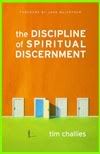 As somebody who has a great respect for tenacity in the face of eejits, I just had to bring you verbatim part of this review by Tim Challies, who contributes to the blog
As somebody who has a great respect for tenacity in the face of eejits, I just had to bring you verbatim part of this review by Tim Challies, who contributes to the blog  Discerning Reader as well as maintaining his own at Challies Dot Com; he's just brought out a book called The Discipline of Spiritual Discernment.
Discerning Reader as well as maintaining his own at Challies Dot Com; he's just brought out a book called The Discipline of Spiritual Discernment.Challies, as Joe Carter explains on First Things, "finds a way to focus on the positive, finding something worthwhile in otherwise lackluster books". Then he quotes the pertinent part of Challies' review of Karen Armstrong's The Case for God:
It is a rare occasion that I find it difficult to point out any redeeming features in a book—when I struggle to find a single positive to write in a review. Unfortunately Karen Armstrong’s The Case for God is one of those books—one that is so monstrously bad, so hopelessly awful, so wretchedly miserable, that it took concerted effort just to finish it. Heck, even the cover stinks—a pile of religiously-significant books hovering at a strange angle over a plain background. I tell you what: I will concede the font. The book is set in Granjon, a very nice, classical font that is very consistent with the earliest Garamond type faces. It is classy and classical but without being antique. But that is as good as the book gets.I remember the former nun's sententious fingerwagging on discussion shows in the 80s and 90s, where she would be introduced as representing the Christian or even the Roman Catholic viewpoint. Her indifferentism as regards very different religions does none of them any favours, and I believe her being given the Rossevelt Institute's Freedom of Worship Medal is a slur on the great man's legacy.
Challies continues in his review: "I can save you thirty-five bucks and many hours of your life by telling you that 99% of what Armstrong has to say about God and religion she squeezes into the Introduction and the Epilogue, which together take up just 23 of the 340 pages of this book. There she spews forth what she really believes about God and those who seek to follow him."
I have to voice my respect for Challies - I haven't got the stamina to start anything by Armstrong, let alone finish it.
'Nuff said.











No comments:
Post a Comment
Please feel free to leave a comment - Frugal Dougal.